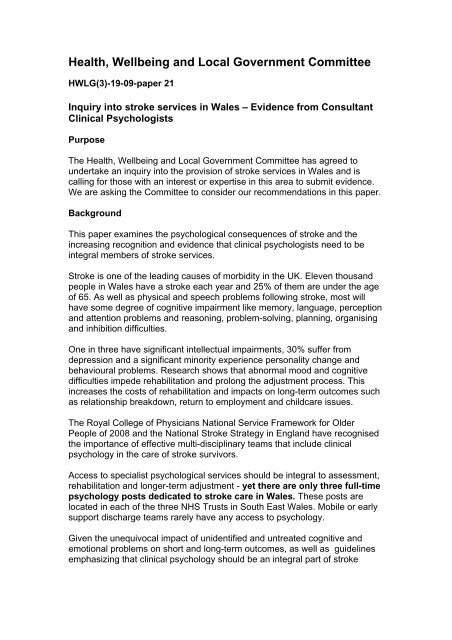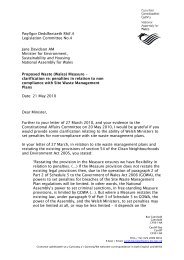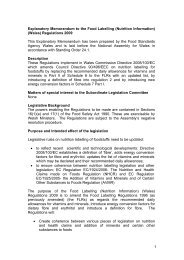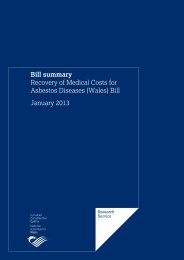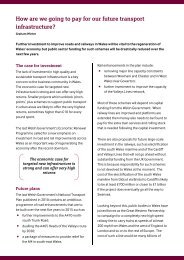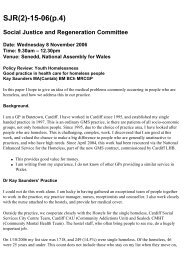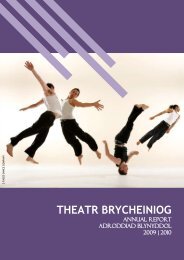HWLG(3)-SSW-017 - Consultant Clinical Psychologists - National ...
HWLG(3)-SSW-017 - Consultant Clinical Psychologists - National ...
HWLG(3)-SSW-017 - Consultant Clinical Psychologists - National ...
You also want an ePaper? Increase the reach of your titles
YUMPU automatically turns print PDFs into web optimized ePapers that Google loves.
Health, Wellbeing and Local Government Committee<strong>HWLG</strong>(3)-19-09-paper 21Inquiry into stroke services in Wales – Evidence from <strong>Consultant</strong><strong>Clinical</strong> <strong>Psychologists</strong>PurposeThe Health, Wellbeing and Local Government Committee has agreed toundertake an inquiry into the provision of stroke services in Wales and iscalling for those with an interest or expertise in this area to submit evidence.We are asking the Committee to consider our recommendations in this paper.BackgroundThis paper examines the psychological consequences of stroke and theincreasing recognition and evidence that clinical psychologists need to beintegral members of stroke services.Stroke is one of the leading causes of morbidity in the UK. Eleven thousandpeople in Wales have a stroke each year and 25% of them are under the ageof 65. As well as physical and speech problems following stroke, most willhave some degree of cognitive impairment like memory, language, perceptionand attention problems and reasoning, problem-solving, planning, organisingand inhibition difficulties.One in three have significant intellectual impairments, 30% suffer fromdepression and a significant minority experience personality change andbehavioural problems. Research shows that abnormal mood and cognitivedifficulties impede rehabilitation and prolong the adjustment process. Thisincreases the costs of rehabilitation and impacts on long-term outcomes suchas relationship breakdown, return to employment and childcare issues.The Royal College of Physicians <strong>National</strong> Service Framework for OlderPeople of 2008 and the <strong>National</strong> Stroke Strategy in England have recognisedthe importance of effective multi-disciplinary teams that include clinicalpsychology in the care of stroke survivors.Access to specialist psychological services should be integral to assessment,rehabilitation and longer-term adjustment - yet there are only three full-timepsychology posts dedicated to stroke care in Wales. These posts arelocated in each of the three NHS Trusts in South East Wales. Mobile or earlysupport discharge teams rarely have any access to psychology.Given the unequivocal impact of unidentified and untreated cognitive andemotional problems on short and long-term outcomes, as well as guidelinesemphasizing that clinical psychology should be an integral part of stroke
services, it is of grave concern that psychology appears to be regarded as a‘luxury’ rather than a necessity.<strong>Clinical</strong> psychologists have the background and training to oversee thepsychological needs of stroke survivors and their families from a variety ofperspectives. Key contributions include:• Assessment of mood and adjustment• Identification of the nature and degree of cognitive impairment• Specific interventions to improve emotional adjustment and cognitiverehabilitation• Promotion of long term psychological adjustment• Assessment of impact on families and their needs• Interventions to help families and to get people back to work wherepossible• Assessments of risk• Assessments of capacityRecommendationsThe <strong>National</strong> Guidelines for Stroke (Royal College of Physicians, 2008a) havecalled for a significant increase in clinical psychology services for strokesurvivors. There is a considerable evidence base for its effectiveness. Thereare a wide range of roles clinical psychologists can adopt not just withinspecialist stroke services but also in other services involved in preventing ormanaging stroke on a long-term basis:1. Routine assessment of mood and cognition should be in place in eachstroke service.2. <strong>Psychologists</strong> are specially trained in the assessment andmanagement of emotional, behavioural and cognitive problems for boththe stroke survivor and their family. They can advise on the mostappropriate means for effectively conveying information to strokesurvivors and their carers.3. <strong>Psychologists</strong> can assist with the long-term adjustment of strokesurvivors, as well as having involvement in co-ordinating appropriatesupport to carers. They can play an important role in helping strokesurvivors and carers overcome psychological barriers to participation incommunity life.4. <strong>Psychologists</strong> can be involved in overcoming psychological barriers,including cognitive deficits, emotional difficulties and confidence issuesthat may block return to work by the person with stroke or their carer.5. <strong>Psychologists</strong> can train other members of the stroke rehabilitation teamin psychological aspects of stroke thereby contributing to holisticmanagement of cognitive, behavioural and emotional changes afterstroke and in meeting the needs of carers.6. <strong>Psychologists</strong> are well placed to provide advice and educationregarding effective strategies to change lifestyle and thus alter strokerisk.
7. All chartered psychologists have research training and are thus wellplaced to initiate, support and develop service audit and strokeresearch in their area of clinical endeavour.The Provision of <strong>Clinical</strong> Psychology Services for Stroke Survivors andtheir Carers in Wales.A recent <strong>National</strong> Sentinel Stroke Audit (2008) indicated a marked reductionin the percentage of patients receiving mood screening in Wales (from 53% in2006 to 46% in 2008).Mood assessed by discharge:-Average for UK England Wales Ireland65 66 46 80This confirms that the provision of clinical psychology services continues tolag behind provision of new stroke units because attention to psychologicalissues in stroke rehabilitation has not been seen as a priority. The issue wasraised in the Stroke Association submission for the Inquiry into StrokeServices in Wales.The British Psychological Society recommended that for the catchment areaof an ‘average’ general hospital (approx 500,000), an adequate level ofstaffing would be two whole time equivalent qualified clinical psychologists(one of whom should be at consultancy level) and one whole time equivalentpsychology assistant. There are only three full-time posts dedicated to strokein Wales and all three are in South East Wales. Within this region there isconsiderable demand for psychological services but there remains large gapsand considerable inequity owing to the size of the region and the population.A. Psychological Consequences of Stroke(i) Impact on Cognition & Behaviour• All patients admitted with cerebrovascular disease are at risk of cognitiveloss and some cognitive loss is probably present in almost all patients(Royal College of Physicians, 2008).• Cognitive problems are wide ranging (e.g. there are many different types ofmemory, attention, perceptual, language or executive problems etc. seeAppendix A). Most patients with cognitive problems will have impairmentsin several domains.• Cognitive impairment can lead to uninhibited or disorganised behaviour ordifficulty moderating emotional expression or impulses, leading in manycases to challenging behaviour. These behavioural and cognitive changesare often the most distressing consequences of stroke for carers (Low etal., 1999).• People ask more questions about psychological matters, particularlymemory and concentration than they do about medical or physical matters(Hanger et al., 1998).
• It is well established that the presence of significant cognitive impairmentfollowing stroke is a predictor of poorer functional outcome (e.g. Diller,2000; Denti et al., 2007).• Early neuropsychological screening is crucial in identifying predictors ofpoor functional and cognitive outcome in people with stroke (Nys et al.,2005).• In mild to moderate strokes recovery of motor and speech problems isgenerally better than certain types of cognitive impairments (e.g. workingmemory/executive functioning). In contrast, ongoing cognitive problemshave major implications for emotional adjustment, functional rehabilitationand quality of life (Langer, Laatsch & Lewis, 1999). Recent research in theJournal of Neurological and Neurosurgical Psychiatry (2009) indicated that70% of patients continue to experience cognitive impairments (especiallyexecutive impairments) leading to social dysfunctioning (a majordimension of quality of life) even several months after a first ever mild tomoderate stroke (Hommel et al., 2009).• A consistent finding which needs to be addressed is how well informationabout stroke is understood and used by both patients and carers (Pain andMcLellan, 1991).• <strong>Clinical</strong> experience indicates that general stroke information may be helpfulfor some patients and their families but, as no two individuals have exactlythe same impairment, individual assessment is frequently required with theprovision of specific, tailored information and advice. This enables patientsto develop improved awareness and understanding of their difficulties,helping adjustment and encouraging use of compensatory and remediationstrategies.• Evidence from general neurorehabilitation indicates that earlierneuropsychological assessment and intervention increase the likelihoodthat patients can be effectively supported to return to work (Johnson,1998).• Accurate and reliable cognitive assessment is important to indicate whethera person is likely to be safe to return to driving and can alleviate the needfor an on-road assessment (McKenna et al., 2004).• Challenging behaviours such as disinhibition, anger, and aggressivenesscan also occur after stroke (Aybek et al., 2005; Santos et al., 2006;). In theabsence of specialist information a family may attempt to explain theperson’s behaviour in terms with which they are familiar (e.g. physical,psychological or even moralistic). This conflict within the family frequentlyarises from such misconceptions and the patient is deprived ofopportunities for use of better management strategies (Langer, Laatsch &Lewis, 1999).• The long-term effects of cognitive impairment are as significant, if not moreso, than physical impairments in the person’s efforts to re-establish familyand social activities (Dijkerman et al., 1996).(ii) Impact on Emotional Adjustment• In the majority of cases a stroke is a devastating life event and it iscommon for patients to experience intense and pervasive emotional or
ehavioural disturbances, such as depression, anxiety and impulse controlpost-stroke.• The prevalence of clinical depression following stroke is about 33%(Hackett, 2005) and research shows that abnormal mood states impederehabilitation (Parikh et al., 1990).• Mood disorders are associated with worse outcomes in the longer term,including increased morbidity and mortality (House et al., 2001).• There has been a research focus on post stroke depression. But the impactof other mood disorders, especially anxiety, is also significant (Astrom,1996; Gillespie, 1997).• Emotionalism (uncontrolled crying or laughing not apparently connected toexternal stimuli), and changes in arousal (emotionally flat, or agitated andunsettled) are often ascribed to damage caused by a stroke. Thesereactions occur frequently and can be distressing for both the patient andfamily (Greveson et al., 1991).• In some cases emotionalism is viewed as pathological (Anderson et al.,1995; House et al., 2001). But changes in emotional expression can alsobe understood as part of an adjustment reaction to the trauma of having astroke (Starkstein et al., 1993).• Diagnosing emotional difficulties following stroke can be a complex task(Gordon & Hibbard, 1997). There is a need for further detailed study of thisarea, in order to gain a better understanding and conceptual clarity. This isimportant as different causes may well require a different treatmentapproach.(iii) Impact on Carers• Serious psychological problems and strain are common in carers (Draper &Brocklehurst, 2007; Hann & Haley, 1999). Carers often find it most difficultto cope with changed personality and there is evidence having having a fullunderstanding of the nature of their loved ones’ difficulties can help them tocope (Mant, 2001).• Carers may adopt counterproductive approaches and become overprotectiveor do too much for the sufferer (Palmer & Glass, 2003) andinadvertently encourage dependency.• Carers consistently express a wish for information, emotional support andassistance with the care-giving task Mant et al., 2000; Morris et al., 2007).They frequently report that services often fail to meet their needs, and thismay be even more marked for young carers and those from ethnic minoritygroups (Commission for Health Improvement, 2004).(iv)Impact on Younger People with Stroke• The risk of stroke increases markedly with age. About 21% of new strokesoccur in those under 65 and at any one time about 25% of all strokesurvivors are under 25 (Kersten et al., 2002; Royal College of Physicians,2008a).• The <strong>National</strong> Stroke Guidelines (Royal College of Physicians, 2008a)acknowledge that younger stroke survivors have special, different needsand that “Some younger adults feel that general stroke services, of which
the majority of users are older adults, do not meet their needs”.Psychological issues for young survivors and their carers are centred ontheir life-stage, with employment, childcare and marital relationships beingprominent concerns (Teasell et al., 2000).B. The Role of the <strong>Clinical</strong> Psychologist<strong>Clinical</strong> psychologists offer a flexible range of skills including assessment,psychological formulation, direct intervention, consultation, clinicalsupervision, and teaching. The focus of their knowledge base is on reaching apsychological understanding of an individual’s behaviour, thoughts andfeelings, and to use this explanation to guide maximally effectiveinterventions. <strong>Clinical</strong> psychologists also possess applied research skills, withmost having received research training at doctoral level. These skills equipthem to participate in service development and audit.The interventions listed below are an indication of the range of activities thathave been undertaken by clinical psychologists working with stroke survivorsin a variety of settings. As above, they are divided into sub-categories forclarity. Where available, references are used to refer to research thatdemonstrates and/or supports the effectiveness of these interventions.(i) Identifying and Managing Stroke Related Cognitive Impairments• The psychologist is able to provide systematic cognitive and moodscreening of patients to improve discharge planning, rehabilitationtreatment, and long-term outcome of people with stroke (Edwards et al.,2006).• At the acute stage many patients are not transferred for further inpatientrehabilitation. In these cases it is essential that neuropsychologicalscreening is provided to ensure that patients are not being discharged withcognitive/behavioural impairments or emotional problems.• Even subtle cognitive impairments can have a devastating impact onquality of life and relationships. A sub-group of patients do not have ongoinglanguage and/or physical problems and these patients are typicallydischarged home without inpatient rehabilitation. <strong>Psychologists</strong> have animportant role to identify those patients at risk ofcognitive/emotional/personality or behavioural impairments, thusencouraging early discharge whilst appropriately identifying, monitoring andintervening to promote better long-term adjustment (e.g. support with returnto work, parenting or relationships).• The earlier psychological/neuropsychological problems are identified, andspecialist advice and support provided for patients and families, the betterwill be long-term outcomes. There are many cases to demonstrate thatwhere this does not occur patients are re-referred in the long-term withaffective disorders. Once patterns of behaviour are well established andfamily relationships have broken down it is much harder to interveneeffectively (see Lincoln, 2005). Thus there are important cost-effectivereasons for early intervention.
• Occasionally other professionals will administer simple bedside screeningtools but staff generally lack the training and skills to interpret thisinformation for the patient and family (e.g. understanding how impairmentsare likely to impact on everyday functioning, behaviour, relationships, returnto work, childcare etc.).• <strong>Psychologists</strong> particularly contribute to the assessment of complex cases,where a combination of impairments renders the use and interpretation ofstandardised assessments inappropriate and inadequate.• Existing bedside cognitive screening tools frequently miss certain types ofcognitive problem (e.g. executive dysfunction) and unidentified subtlecognitive problems can have a profound impact on long-term recovery(changes in function, personality and behaviour). <strong>Clinical</strong>psychologist/neuropsychologists have the knowledge and skills to identifythe cases when this might occur and to follow up patients with furtherspecialist assessment and intervention.• <strong>Psychologists</strong> are able to undertake detailed assessment of memory,executive functioning, and perceptual disorders in order to inform thedesign of cognitive rehabilitation strategies (Wilson, 1999).(ii) Psychosocial Adjustment and Emotional Disorders• <strong>Psychologists</strong> play an important role in effective management of patientswho present with disinhibition, anger, and aggressiveness (Goldstein,2003).• Depression is not an inevitable long term consequence of stroke and muchcan be done to help those who do have a depressive episode (Kneeboneand Dunmore, 2000). Identification and discrimination between adjustmentdisorder, emotionalism and depression can be difficult, and requires thedevelopment of specific expertise (Kneebone and Dunmore, 2000; Houseet al., 2001). This is important as each person requires a differenttreatment.• There is increasing evidence that psychological interventions reduce therisk of depression after stroke and that the evidence is limited on theeffectiveness of pharmaceutical interventions (House et al., 2001; Watkinset al., 2007; Buchanan, 2009).• <strong>Clinical</strong>ly, therapy may be preferred especially where there are side effectsassociated with medication (Diller, 2000; Kneebone & Dunmore, 2000).• Approximately 10% of stroke patients present with post-traumatic stress.<strong>Psychologists</strong> possess the knowledge and skills to recognise the indicatorsof this, to train staff in recognition and design individualised approaches tohelp patients adjust.(iii) Supporting Carers• Carer needs include psychological support with adjustment to rolechanges, identification and treatment of depression, and the need foreducation regarding cognitive and other changes in their loved one.• Carers help to maintain survivors’ psychological well-being (Morris et al.,1991) and better short and long-term outcomes can be achieved with earlyengagement and emotional support.
• Carers often find it most difficult to cope with changes in personality, andthere is evidence that having a full understanding of the nature of theirloved one’s difficulties can help them to cope (Mant, 2001).• The psychologist has an important role to play in the provision of educationto patients, carers and staff on what to expect following a stroke. Attentionto psychosocial aspects is of great importance, as evidence suggestsconventional rehabilitation focusing on physical improvement and theprovision of information can still leave people socially restricted andemotionally distressed (Pain & McLellan, 1990; Young & Forster, 1992).(iv) Improving Service Delivery in Stroke• <strong>Psychologists</strong> are an important resource in the promotion of partnershipworking and can be involved in establishing systems to obtain users’ viewsabout services. This information can provide feedback on services whichcan drive improvement.• <strong>Psychologists</strong>’ training equips them with an understanding of teamdynamics and to work at an organisational level to support and enhanceteam functioning (Onyett, 2007). As the key to successful strokerehabilitation is seen as the multi-disciplinary team (Royal College ofPhysicians 2008a), this will be invaluable in stroke services.• Conveying information about the outcome of psychological assessmentand intervention is important with stroke survivors. Additionally there areareas in which psychological information can be conveyed more generallyvia teaching input to, and consultation with, other members of the stroketeam.• <strong>Clinical</strong> psychologists also have an important role in relation to teachingand consultation with staff groups other than the immediate stroke team. Inparticular, engaging with social/community services, staff in nursing homesand residential placements where there is a need to manage behaviouraldifficulties. Similarly important is teaching and consultation within primarycare. This is required for both long-term follow up of stroke survivors aswell as working on primary preventive strategies.• <strong>Clinical</strong> psychologists have also made an important contribution to existingresearch into the field of stroke.(v) Capacity• Where there is doubt about a person’s ability to make decisions following astroke, clinical psychologists are trained to use cognitive assessment,interview and observational data to assess decision-making capacity in thecontext of the Mental Capacity Act (2005). Such decisions can involvemedical treatment, hospital discharge destination, and other social orfinancial issues.CASE STUDY 1 - Mental Health Capacity DecisionA psychological assessment was undertaken to judge whether a patient,following a stroke, had the capacity to make the decision to return home. In
particular, did he have insight into his physical limitations and thereforerecognise the need for a package of care. The situation was made morecomplex due to the breakdown of this patient’s relationship with his wife. Itwas recognised that his wife was under a great deal of stress and wasphysically unwell herself. She actually did not want him to return home as hehad been, according to his wife, increasingly verbally abusive towards herover the last few years and had expected her to carry out all aspects of theirdomestic life. Their son was fully supportive of his mother and agreed with herthat his father should be placed in a residential setting.The psychological involvement included a full neuropsychological assessmentof the patients’ cognitive abilities plus observation of the individual infunctional tasks (i.e. self care skills), and in physical tasks (duringphysiotherapy sessions). It also involved a discussion with the patient to gainan understanding of the position from his point of view. In addition thepsychologist took a holistic view of the situation and the stress that allmembers of the family were under. The input included psychological supportand understanding for the son and his mother. In addition full recognition ofthe patient’s rights to return home was essential. The psychologist alsoprovided emotional support to the patient. Through these diverse interventionsthe psychologist provided a detailed formulation of the complex presentation.As well as the specific clinical skills, the psychologist also provided support toteam members to manage and work with such a complex presentation,through consultation, team meetings, and information sharing. The teamlooked to the psychologist to lead the family/goal planning meetings due tothe complexity of the case.CASE STUDY 2This case provides an example of a younger stroke patient referred to clinicalpsychology two years post stroke and where there had been no psychologistin post at the time of the stroke. This illustrates the problems which can occurwhen patients do not receive appropriate assessment prior to hospitaldischarge, the lack of understanding of other professionals and families of theproblems that can occur afterwards, and their potential consequences.The patient, in her early forties, was discharged from an acute hospital withsevere expressive dysphasia but no on-going physical problems. She wasreferred for outpatient speech and language therapy, but rarely attendedthese appointments. Six months later she developed epilepsy and, owing toseveral other health problems multiple services, agencies and professionalsbecame involved. By the time of referral to psychology she had developedsignificant emotional and behavioural problems.She was on anti-depressant medication for her mood swings. She was in adownward spiral as the antidepressants worsened the epilepsy anduncontrolled multiple seizures increased her cognitive, emotional andbehavioural problems. Despite multiple health services being involved in hercare, the patient was continually distressed and agitated. On a daily basis she
would be found lying on the floor screaming in distress and anger. Thesupport from her relatives had broken down as they were unable to manageand were frustrated by her lack of recovery (unrealistic expectations). Thepatient depended on the care of her child. The child's mood was low, sherarely attended school or engaged with her peers. She reported waiting for theday when her mother would recover to her 'pre-stroke self'.Psychology assessment indicated that, in addition to expressive dysphasia,the patient also had a range of cognitive impairments in the executive domain,for example, she was aware of household tasks she needed to do but lackedinitiation and motivation to complete them without prompting. Her ability toretain and process verbal information was impaired and, whilst there was noevidence of perceptual impairments, there was evidence of impairedorganisation and construction on visuo-spatial tasks. Working memory waspoor and her ability to attend to complex auditory information, encode it andtransfer it into longer-term storage was poor. Problems in these areas typicallyhave a significant impact on a patient's ability to function (even in cases wherepatients have intact language and physical function). In addition to cognitiveimpairment, the patient was focused on her own needs and unable toconsider the emotional or practical needs of her child, or show warmth oraffection to her.The patient presented with low mood and anxiety but she was not clinicallydepressed. She misinterpreted bodily sensations associated with anxiety assigns of an oncoming seizure and her low mood related to her inability tofunction at the level expected by others. Her cognitive problems had neverbeen assessed and explained to the family. Thus their expectation was of afull recovery and they were attempting to force her to do activities of dailyliving for herself and her child. This only resulted in the child completing thetasks, leaving the patient feeling disempowered and unhappy. She had manyabilities that were unaffected by the stroke but development of these skills toenable her to gain confidence and independence required specialist adviceand intervention. Other family members had control of her finances and shewas unable to make any decisions about her life.The role of the psychologist was to provide an assessment and formulation ofthe patient’s cognitive and emotional problems in order to guide intervention.Systemic work was required to engage all the agencies involved in her care.The psychological formulation guided the intervention plan which includededucation and training of staff/family on the nature of the patient's emotionaland cognitive problems. A more appropriate long-term package of support forboth mother and child was developed. This was aimed at re-enabling thepatient to have control of her own finances and to develop her own goals withappropriate support. Anxiety management was provided but adapted to takeinto account the nature of her language and cognitive impairments.Referral and liaison with child services was undertaken, as well as thepsychologist engaging with the school to aid understanding and provide thenecessary support for the child.
Outcome: The patient’s emotional problems were resolved, her epilepsystabilised as her mood and anxiety states improved. She was provided withmore appropriate long-term support, systems and compensatory strategies toenable her to manage her own home and finances. With support she startedto participate in a wide range of social activities. Her speech showed someimprovement as her mood improved and anxiety decreased. She has gainedin confidence and self-efficacy, and both she and her child's quality of lifehave significantly improved. She no longer requires the input of multipleagencies.Dr Julie Wilcox<strong>Consultant</strong> <strong>Clinical</strong> PsychologistCardiff and Vale NHS TrustDr Tanya Edmonds<strong>Consultant</strong> <strong>Clinical</strong> PsychologistCwm Taf NHS TrustAugust 2009
References:Andersen, G., Vestergard, K. & Ingeman-Neilsen M. (1995). Post-strokepathological crying: Frequency and correlation to depression. EuropeanJournal of Neurology, 2, 45-50.Astrom, M. (1996). Generalized anxiety disorder in stroke patients: A 3-yearlongitudinal study. Stroke, 27, 270-275.Aybek, S., Carota, A., Ghika-Scmid, F., Berney, A., Melle, G.V. Guex, P. et al.(2005). Emotional behaviour in acute stroke: The Lausanne emotion in strokestudy. Cognitive & Behavioural Neurology, 18, 37-44.Buchanan, D., (2009). Review: psychological interventions preventdepression after stroke. Evidence Based Nursing, 12, 23.Burvill, P.W., Johnson, G.A., Jamrozik, K.D., Anderson, C.S., Stewart-Wynne,E.G. & Chakera, T.M.H. (1995). Prevalence of depression after stroke: ThePerth community stroke study. British Journal of Psychiatry, 66, 320-327.Caplan, B.C. & Shecter, J. (1995). The role of nonstandardneuropsychological assessment in rehabilitation: History, rationale, examples.In L.A. Cushman and M.J. Scheerer (Eds.) Psychological assessment inmedical rehabilitation (pp.359–392). Washington, DC: American PsychiatricAssociation.Commission for Health Improvement (2004). Unpacking the patient'sperspective: Variations in NHS patient experience in England. London:Author.Denti, L., Agosti, M. & Francheschini, M. (2008). Outcome predictors ofrehabilitation for first stroke in the elderly. Europea Jourrnal of Physical andRehabilitation Medicine, 44, 3-11.Department of Health (2007). <strong>National</strong> stroke strategy. London: AuthorDijkerman, H.C, Wood, V.A. & Hewer, R.L. (1996). Long-term outcome afterdischarge from a stroke rehabilitation unit. Journal of the Royal College ofPhysicians of London, 30, 538-546.Diller, L. (2000). Post-stroke rehabilitation practice guidelines. In A.L.Christensen & B.P. Uzzell (Eds.) International Handbook ofNeuropsychological Rehabilitation (pp.167–182). New York: KluwerAcademic/Plenum Publishers.Draper, P, & Brocklehurst, H.( 2007). The impact of stroke on the well being ofthe patients spouse an exploratory study. Journal of <strong>Clinical</strong> Nursing, 16, 264-271.
Edwards, D.F., Hahn, M.G., Baum, C.M., Perlmutter, M.S., Sheedy, C. &Dromerick, A.W. (2006). Screening patients with stroke for rehabilitationneeds: Validation of the post-stroke rehabilitation guidelines.Neurorehabilitation and Neural Repair, 20, 42-48.Gielissen, M. F.M., Verhagen, S., Witjes, F. & Bleijenberg, G. (2006). Effectsof cognitive behavior therapy in severely fatigued disease-free cancer patientscompared with patients waiting for cognitive behavior therapy: A randomizedcontrolled trial. Journal of <strong>Clinical</strong> Oncology, 24, 4882-4887.Gillespie, D.C. (1997). Post-stroke anxiety and its relationship to coping andstage of recovery. Psychological Reports, 80, 1059-1064.Goldstein, L.H. (2003). Behaviour problems. In R. Greenwood, M. Barnes, T.M. McMillan & C. D. Ward (Eds.) Handbook of neurological rehabilitation (2ndedn., pp.419-432). Hove UK: Erlbaum, Taylor and Francis.Gordon, W.A. & Hibbard, M.R. (1997). Post-stroke depression: Anexamination of the literature. Archives of Physical Medicine andRehabilitation, 78, 658-663.Hackett, .M.L, Yapa, C., Parag, V. & Anderson, C.S. (2005). Frequency ofdepression after stroke: A systematic review of observational studies. Stroke,36, 1330.Han, B., & Haley, W.E. (1999). Family care giving for patients with stroke.Review and analysis. Stroke, 30, 1478-1485.Hommel, M., Miguel, S. T., Naegele, B., Gonnet, N. & Jaillard, A. (2009).Cognitive Determinants of social functioning after a first ever mild to moderatestroke at vocational age. J Neurol Neurosurg Psychiatry, 80, 876-880.House, A., Knapp, P., Bamford, J. & Vail, A. (2001). Mortality at 12 and 24months after stroke may be associated with depressive symptoms at onemonth. Stroke, 32, 696-701.House, A., Hackett, M.L. & Anderson, C.S. (2001). Effects of antidepressantsand psychological therapies for reducing the emotional impact of stroke.Proceedings of the Royal College of Physicians of Edinburgh, 31, supplement8, 50-60.Johnson, R. (1998). How do people get back to work after severe brain injury?A 10-year follow up study. Neuropsychological Rehabilitation, 8, 61-79.Johnston, M. Pollard, B., Morrison, V. & MacWalter, R. (2004). Functionallimitations and survival following stroke: Psychological and clinical predictorsof three year outcome. International Journal of Behavioral Medicine, 11, 187-196.
Kersten, P., Low, J.T.S., Ashburn, A., George, S.L., & McLellan, D.L. (2002).The unmet needs of young people who have had a stroke: results of anational survey. Disability and Rehabilitation, 24, 860-866.Kneebone, I. & Dunmore, E. (2000). Psychological management of poststrokedepression. British Journal of <strong>Clinical</strong> Psychology, 39, 53-66.Langer,K.G., Laatsch, L., & Lewis ,L. (1999). Psychotherapeutic Interventionsfor Adults with Brain Injury or Stroke: A Clinician’s Treatment Resource.Lincoln, N. (2005). Outcome of cognitive rehabilitation in clinical strokeservices. In P.W. Halligan and D.T. Wade (Eds.), Effectiveness ofRehabilitation for Cognitive Deficits. Oxford: Oxford University Press.Lincoln, N., Majid, M.J. & Weyman, N. (2000). Cognitive rehabilitation forattention deficits following stroke. Cochrane Database of Systematic Reviews,(4); CD002842.Mant, J., Carter, J., Wade, D.T. & Winner, S. (2000). Family support forstroke: A randomised controlled trial. Lancet, 356, 808-813.Mant, J. (2001). Overview of the evidence for stroke family care workers.Proceedings of the Royal College of Physicians of Edinburgh, 31, supplement8, 44-49.McKenna, P., Jeffries, L., Dobson, A. & Frude, N. (2004). The use of acognitive battery to predict who will fail an on-road driving test. British Journalof <strong>Clinical</strong> Psychology, 43, 325-336.McLean, J., Roper-Hall, A., Mayer, P. & Main, A. (1991). Service needs ofstroke survivors and their informal carers: A pilot study. Journal of AdvancedNursing, 16, 559-564.Morris, P.L., Robinson, R.G., Raphael, B. & Bishop, D. (1991). Therelationship between the perception of social support and post-strokedepression in hospitalized patients. Psychiatry, 54, 306-316.Morris, R., Payne O., Lambert, A. (2007). Patient, carer and staff experienceof a hospital-based stroke service. International Journal of Quality HealthCare 19, 105-112.<strong>National</strong> Service Framework for Older People. (2008). www.wales.nhs.ukNys, G.M., van Zandvoort, M.J., de Kort, P.L., Jansen, B.P., de Haan, E.H. &Kappelle, L.J. (2007). Cognitive disorders in acute stroke : Prevalence andclinical determinants. Cerebrovascular Disorders, 23, 408-416.Nys, G.M., van Zandvoort, M.J., de Kort, P.L., van der Worp, H.B., Jansen,B.P. Algra, A. et al. (2005). The prognostic value of domain-specific cognitiveabilities in acute first-ever stroke. Neurology, 64, 821-827.
Onyett, S. (2007). New ways of working for applied psychologists in healthand social care – Working psychologically in teams. Leicester: The BritishPsychological Society.Pain, H.S.B., & McLellan, D.L. (1990). The use of individualised booklets aftera stroke. <strong>Clinical</strong> Rehabilitation, 4, 265-272.Palmer, S. & Glass, T.A. (2003). Family function and stroke recovery: Areview. Rehabilitation Psychology, 48, 255-265.Parikh, R.M., Robinson, R.G., Lipsey, J.R., Starkstein, S., Federoff, J. & Price,T. (1990). The impact of post stroke depression on recovery in activities ofdaily living over a two year follow-up. Archives of Neurology, 47, 785-789.Pohjasvaara, T., Leskela, M., Vataja, R., Kalska, H., Ylikoski, R. Hiatanen, M.et al. (2002). Post-stroke depression, executive dysfunction and functionaloutcome. European Journal of Neurology, 9, 269–275.Royal College of Physicians (2008a). <strong>National</strong> <strong>Clinical</strong> Guidelines for Stroke(3 rd edn). London: Royal College of Physicians.Santos, C.O., Caeiro, L., Ferros, J.M., Albuquerqu, R. & Figuiera, M.L. (2006).Anger, hostility and aggression in the first days of acute stroke. EuropeanJournal of Neurology, 13, 351-358.Starkstein, S., Federoff, J., Price, T.R., Liegurda, R.S. & Robinson, R.G.(1993). Catastrophic reactions after cerebrovascular lesions: Frequency,correlates and validation of a scale. Journal of Neurology and <strong>Clinical</strong>Neuroscience, 5, 189-194.Stroke Association (2001). Speaking out about stroke services: A survey bythe Stroke Association. London: Author.Teasell, R., McRae, M.P., & Finestone, H.M. (2000). Social Issues in therehabilitation of young stroke patients. Archives of Physical Medicine andRehabilitation, 81, 205-209.Watkins,C.L., Auton, M.F., Deans, C.F., Dickinson, H.A., Cathy I.A., Jack,C.I.A., et al. (2007). Motivational interviewing early after acute stroke: Arandomized, controlled trial. Stroke, 38, 1004-1009Wilson, B.A. (1999). Case Studies in Neuropsychological Rehabilitation.Oxford: Oxford University Press.Young, J.B. & Forster, A. (1992). The Bradford Community Stroke Trial:Results at six months. British Medical Journal, 304, 1085-1089.
Appendix AStroke related cognitive ImpairmentMemory• Lincoln and Tyson (1989) found that 49% of cases were impaired onmemory tests at 7 months after stroke and reports of forgetfulness ineveryday life were common.• Different forms of memory impairment occur: the inability to lay down newmemories, difficulty or inability in retrieving old (or new) memories, troubleremembering faces or names (without any evidence of dysphasia), ordifficulty in one modality, e.g. verbal or visual memory with relativeintactness of the other.• Hanger et al. (1998) confirmed that mild to moderate forgetfulness wascommon late after stroke and could arise from a variety of underlyingcognitive impairments.Language• Difficulty producing or understanding speech (expressive or receptiveaphasia, dysphasia) are the most obvious problems in mental functioningand are present in up to one third of cases at 1 month after stroke (Wade etal., 1986).• Difficulty understanding written text, understanding number (dyslexia,agraphia).• Higher order disturbances of language (high level dysphasia).Perception• Visual inattention (neglect) is an inability to attend to visual stimuli in oneside of the visual environment. Estimates of incidence vary widely between8% and 90% of sub-acute cases (Bowen & Lincoln, 2007).• Intervention can be effective (Bowen & Lincoln, 2007; Riggs et al., 2007).• Inattention can also be present in other sensory modalities (e.g. hearingand touch).
• Hemianopia, involving loss of perception of one half of the visual field, iscommon and should be assessed as there is some evidence thatintervention for this can be effective (Riggs et al., 2007).• Additional perceptual problems include lack of ability to orient in space(left/right or up/down discrimination), awareness of position of limbs(proprioception), and inability to identify objects (visual agnosia).Attention can include impairments of sustained, selective, switching ordivided attention (Robertson et al., 1994; Stuss et al., 1989).• Cognitive rehabilitation techniques can be effective in managing problemswith attention (Robertson, 1999).Controlling action (apraxia)• Difficulty in thinking about movement (apraxia) may be present in 40% ofcases within a month of stroke and leads to clumsiness on dexterity tasks(Sunderland et al., 1999). Problems in spatial awareness and in sustainingattention may also affect control of movement. As yet, there is currentlymixed support as to the effectiveness of specific therapeutic interventionsfor motor apraxia after stroke (Cicerone et al., 2005; West et al., 2008)Executive functioning• The ‘dysexecutive syndrome’ refers to difficulties with planning, organising,problem-solving, initiating, adapting and monitoring behaviour.• Impairment can lead to disinhibited or disorganised behaviour, or difficultymoderating emotional expression or impulses.• <strong>Clinical</strong>ly significant executive dysfunction is a frequent consequence ofstroke, and is associated with dementia and disability (Pohjasvaara et al.,2002).
Psychology Concise Guide for Stroke 2008This concise guide contains recommendations extracted from the <strong>National</strong> <strong>Clinical</strong> Guideline for Stroke,3rd edition 1 , which contains over 300 recommendations covering almost every aspect of strokemanagement.The recommendations selected for this concise guide have direct implications for psychologists andpsychiatrists. However, the psychological sequelae of stroke affect all aspects of stroke management andlife after stroke and many of these recommendations are relevant to all service providers.Recommendations are given below with their number, so that they can be found in the main guideline.This concise guide was compiled by Audrey Bowen and Peter Knapp, representing the British PsychologicalSociety, and psychology working party members Jane Barton, David Gillespie, Janet Cockburn andAndrew Bateman.Specialist stroke services (3.2.1)BCAnnexAll patients not suitable for transfer home aftercompletion of their acute diagnosis andtreatment should be treated in a specialiststroke rehabilitation unit which should fulfil thefollowing criteria:● it should have a co-ordinatedmultidisciplinary team that meets at leastonce a week for the interchange ofinformation about individual patients;● the staff should have specialist expertise instroke and rehabilitation;● educational programmes and informationare provided for staff, patients and carers.All patients discharged home directly afteracute treatment but with residual problemsshould be followed up by specialist strokerehabilitation services.Resources (3.3.1)B Each stroke rehabilitation unit and serviceshould be organised as a single team of staffwith specialist knowledge and experience ofstroke and neurological rehabilitationincluding:● clinical psychologists.Stroke services for younger adults (3.5.1)A Younger adults who have had a stroke should bemanaged within specialist medical andrehabilitation services that:● recognise and manage the particularphysical, psychological and social needs ofyounger patients with stroke (e.g. vocationalrehabilitation, child care activities).Transfers of care – discharge from hospital(3.7.1)GAll patients should continue to have access tospecialist stroke services after leaving hospital,and should know how to make contact.Goal-setting (3.11.1)Every patient involved in the rehabilitationprocess should:B participate in the process of setting goals unlessthey choose not to or are unable to participatebecause of the severity of their cognitive andlinguistic impairments;C be given help to understand the nature andprocess of goal setting, and be given help(e.g. using established tools) to define andarticulate their personal goals;D have goals that:● are meaningful and relevant to the patient;● are challenging but achievable;● include both short-term (days/weeks) andlong-term (weeks/months) targets;● include both single clinicians and also thewhole team;● are documented, with specified, time-boundmeasurable outcomes;● have achievement evaluated using goalattainment;● include family members where appropriate;● are used to guide and inform therapy andtreatment.Use of assessments/measures (3.10.1)A stroke rehabilitation service should:D train all staff in the recognition andmanagement of emotional, communicative andcognitive problems.Psychology Concise Guideline for Stroke 2008© Royal College of Physicians, 2008. All rights reserved.
<strong>National</strong> <strong>Clinical</strong> Guideline for StrokePsychology Concise Guideline for Stroke 2008Rehabilitation treatment approach (3.12.1)All members of a stroke service should:A use an agreed consistent approach for eachproblem faced by a patient, ensuring thepatient is given the same advice and taught thesame technique to ameliorate or overcome it;B give as much opportunity as possible for apatient to practise repeatedly and in differentsettings any tasks or activities that are affected.End-of-life (palliative) care (3.14.1)A Teams providing care for patients after strokeshould be taught how to recognise patients whomight benefit from palliative care.B All staff caring for people dying with a strokeshould be trained in the principles and practiceof palliative care.C All patients who are dying should have access tospecialist palliative care expertise when needed.Self-efficacy training (6.13.1)A All patients should be offered training in selfmanagementskills, to include activeproblem-solving and individual goal-setting.B Any patient whose recovery appears delayed orlimited should be assessed for changes in selfidentity,self-esteem and self-efficacy (as well aschanges in mood; see 6.25).C Any patient with significant changes in selfesteem,self-efficacy or identity should beoffered additional (to A) interventions that mayreduce these impairments such as motivationalinterviewing and positive therapeutic feedback.Depression (6.25.1)A Every patient entering rehabilitation should bescreened for depression using a validatedsimple screening test (e.g. asking ‘Do you feeldepressed?’ or the GHQ-12 or PHQ-9questionnaire). In addition:● mood should also be assessed at later times,especially after stopping active rehabilitationor if depression is suspected;● screening tests such as ‘smiley faces’ orobservational criteria alone should not berelied upon as the sole means of initialdiagnosis;● questionnaires may be simplified to a yes/noformat for people with communicationdifficulties;● the patient’s past should be investigated forany history of mood disturbance.B In people with aphasia and other impairmentscomplicating assessment of mood, carefulobservations over time (including response to atrial of antidepressant medication if considerednecessary) should be used.C Any patient with depressed mood should beprovided with appropriate information andadvice.D Any patient who has depression sufficient tocause distress and/or to impede rehabilitationshould be assessed clinically for furthertreatment by an expert (e.g. clinicalpsychologist, appropriately trained strokephysician, psychiatrist).E Any patient considered to have depressionshould be screened for anxiety andemotionalism.F Patients with minor depression should bemonitored for progression and worsening andshould be especially involved in one or more of:● increased social interaction;● increased exercise;● goal setting;● other psychosocial interventions (e.g. usingvoluntary sector resources).G Patients whose depression is more severe orpersistent should be offered one or more of:● antidepressant drug treatment;● psychological therapy given by anappropriately trained and supervisedpractitioner;● interventions to reduce any contributoryfactors such as pain and social isolation (e.g.attending voluntary sector stroke groups).H Antidepressant treatment should:● not be used routinely to prevent depressiondeveloping or to improve other outcomes;● be monitored, and continued for at least sixmonths if a benefit is achieved.Anxiety (6.26.1)A Every patient entering the rehabilitation phaseshould be screened for anxiety, usually simplyby asking about the patient’s concerns or byasking family members.B Any patient with anxiety should have thecause(s) established, and should be providedwith appropriate information and advice.C Any patient whose anxiety is impeding their2© Royal College of Physicians, 2008. All rights reserved.
Psychology Concise Guide for Stroke 2008recovery and rehabilitation or causing distressshould be:● assessed and considered for psychologicaltreatment, for example desensitisation orcognitive behavioural therapy;● be screened for emotionalism and depression.Emotionalism (6.27.1)A Any patient who cries or laughs in unexpectedsituations or who is upset by their fluctuatingemotional state should be assessed by aspecialist able to diagnose emotionalism.B Patients with severe, persistent or troublesometearfulness (emotionalism) should be givenantidepressant drug treatment, monitoring thefrequency of crying to check effectiveness.Cognitive impairments – general (6.28.1)A Every patient seen after a stroke or transientischaemic episode should be considered to haveat least some cognitive losses in the early phase.● Routine screening should be limited todetecting more severe levels of cognitiveimpairment using simple standardisedmeasures (e.g. mini-mental state examinationor short orientation–memory–concentrationtest).B Any patient not progressing as expected inrehabilitation should have a more detailedcognitive assessment to determine whethercognitive losses are causing specific problems orhindering progress.C The patient’s cognitive status should be takeninto account by all members of themultidisciplinary team when planning anddelivering treatment.D Planning for discharge from hospital shouldinclude an assessment of any safety risks frompersisting cognitive impairments.E People returning to cognitively demandingactivities (e.g. some work, driving) should havetheir cognition assessed formally prior toreturning to the activity.Attention and concentration (6.29.1)A Any person after stroke who appears easilydistracted or unable to concentrate should havetheir abilities to focus, sustain and divide theirattention formally assessed.B Any person with impaired attention should havecognitive demands reduced through:C● having shorter treatment sessions;● taking planned rests;● reducing background distractions;● avoiding work when tired.Any person with impaired attention should:● be taught strategies to compensate forreduced attention;● receive repeated practice of activities they arelearning.Memory (6.30.1)ABPatients who complain of marked memoryimpairment and patients clinically consideredto have difficulty in learning and rememberingshould have their memory assessed formallyusing a standardised measure such as theRivermead Behavioural Memory Test.Any patient found to have memory impairmentcausing difficulties in rehabilitation orundertaking activities should:● be assessed medically to check that there isnot another treatable cause or contributingfactor (e.g. hypothyroidism);● have their profile of impaired and preservedmemory abilities determined;● have their nursing and therapy sessionsaltered to use techniques which capitalise onpreserved abilities;● be taught compensatory techniques toreduce their disabilities, such as usingnotebooks, diaries, audiotapesand electronic organisers and audio alarms;● be taught approaches aimed at directlyimproving their memory;● have therapy delivered in an environmentthat is as like the usual environment for thatpatient as possible.Spatial awareness, e.g. neglect (6.31.1)A Any patient with a stroke affecting the righthemisphere should be considered at risk ofreduced awareness on the left, and should betested formally if this is suspected clinically.B Any patient with suspected or actualimpairment of spatial awareness should havetheir profile of impaired and preserved abilitiesevaluated using a standardised test battery suchas the Behavioural Inattention Test.The diagnosis should not be excluded on thebasis of a single test.Psychology Concise Guideline for Stroke 2008© Royal College of Physicians, 2008. All rights reserved.3
<strong>National</strong> <strong>Clinical</strong> Guideline for StrokePsychology Concise Guideline for Stroke 2008C Any patient shown to have impaired attentionto one side should be:● given cues to draw attention to the affectedside during therapy and nursing procedures;● monitored to ensure that they do not eat toolittle through missing food on one side;● given a trial of visual scanning training;● given trials of mental imagery training,structured feedback or using prisms if theunawareness is severe and persistent.Perception – visual agnosia (6.32.1)A Any person who appears to have difficulty inrecognising people or objects should beassessed formally for visual agnosia.B Any person found to have agnosia should:● have the impairment explained to them,their family and their treating team;● be taught strategies to compensate for thespecific agnosia(s) as far as possible.Apraxia (6.33.1)A Any person who has difficulties in executingtasks despite apparently adequate limbmovement should be assessed formally for thepresence of apraxia.B Any person found to have apraxia should:● have their profile of impaired and preservedaction abilities determined as part of theirassessment after their stroke using astandardised approach such as theNaturalistic Action Test or the Apraxia Test;● be given therapies and/or taughtcompensatory strategies specific to thedeficits identified;● have the impairment explained to them,their family, and their treating team.CWhen a patient’s activities are affected by anexecutive disorder, the nature and effects of theimpairment and ways of supporting and helpingthe patient should be discussed with othersinvolved (e.g. family, staff).Mental capacity, decision making by the patient(6.35.1)BCDHThe patient’s mental capacity should specificallybe considered and documented when they arebeing asked to agree to a procedure thatinvolves significant risk, noting that judgementson capacity must relate to the specific decisionbeing made.In cases of doubt the clinician shoulddetermine that the answer to all four of thequestions below is positive before concludingthat the patient has competence:● Does the patient understand the informationrelevant to the decision?● Has the patient retained the informationrelevant to the decision?● Can the patient use, or weigh up theinformation when making a decision?● Can the patient communicate their decisionby some reliable means?In patients where the answer to one or more ofthe above questions is negative or uncertain:● all attempts should be made to overcome thelack of capacity (e.g. asking a speechtherapist to help with communication);● a second opinion should be sought if there isdoubt or if assistance is needed.The capacity of the patient to make decisionsshould be reviewed at an appropriate intervalwhich will be dependent upon the clinicalsituation.Executive functioning (6.34.1)A Any person who appears to have adequate skillsto perform complex activities but who fails toorganise the tasks needed should be formallyassessed for the dysexecutive syndrome, forexample, using the Behavioural Assessment ofthe Dysexecutive Syndrome (BADS).B Any person with an executive disorder andactivity limitation should be taughtcompensatory techniques (e.g. use of electronicorganisers or pagers, or use of writtenchecklists).Reference1Intercollegiate Stroke Working Party.<strong>National</strong> <strong>Clinical</strong> Guideline for Stroke, 3rd edition.London: Royal College of Physicians, 2008.British Psychological Society contactDr Audrey Bowen, Senior Lecturer inPsychology, HCD, SPS, University ofManchester, Oxford Road,Manchester M13 9PL, UK.E-mail audrey.bowen@manchester.ac.ukPrinted by the British Psychological Society© Royal College of Physicians, 2008. All rights reserved.


